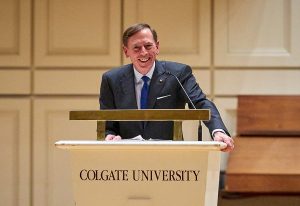Building projects get off the ground
Photo above: Robert Johnson ’94 took this picture showing campus building projects in the fall.
Shiny copper roof flashing and grand white-mullioned windows signaled the buttoning-up of Benton Hall’s exterior just as early winter snowfalls began to blanket the campus.
When it opens in July 2018, Benton Hall will stand as a best-in-class career center — and then some. It’s part of a current $60 million building investment to enhance the Colgate student experience in both residential life and career preparation.
“There are few, if any, campuses building a stand-alone career center,” said Mike Sciola, associate vice president of institutional advancement and career initiatives. The 18,500-square-foot building will move a department that served nearly 2,600 students last year in Spear House — which was built in the early 19th century — to a structure specifically designed to be the catalyst for the university’s 21st-century, comprehensive career development operation.
Since 2012, Colgate has greatly expanded its career development offerings for students, from pre-matriculation through senior year and beyond. Programming is aimed at connecting students’ academic and career interests with opportunities for gaining practical and entrepreneurial skills, career exploration, internships, and jobs. In 2016–17, more than 97 percent of the student body participated in career services appointments, events, workshops, and/or signature programs. The department has also seen a nearly fivefold increase in employer visits over the past five years.
With welcoming entrances from both the Academic Quad and Oak Drive, Benton Hall will allow Colgate to provide seamless postgraduate exploration and planning by bringing together the Center for Career Services, the Office of National Fellowships and Scholarships, and the Thought Into Action entrepreneurship program’s administrative office under one roof.
The building features suites for advising, employer relations, and interviews; reception areas; and administrative offices. And with flexible public areas such as a large “career commons” and a seminar room, Benton Hall will serve as a hub for activities like networking events, information sessions, and entrepreneur team workshops — as well as academic classes, seminars, lectures, exhibitions, and performances. Ten spaces will have videoconference capabilities, “so we will be able to connect with alumni from all over the world to interface with our students in real time,” Sciola said.
“The vision for the program was to offer our students what the world will demand for career success in the 21st century,” Sciola said. “Benton Hall came out of the fact that we needed a facility that offered the flexibility and advanced technology to achieve what our graduates will need.”
The $16.4 million-dollar, 100 percent donor-funded building, which is named for Colgate Trustee Daniel C. Benton ’80, P’10, H’10, was designed by R.M. Stern Architects, one of the world’s top academic architectural design firms, and adheres to LEED Silver sustainability standards. Romanesque exterior touches will reflect architectural features from both Hascall and James B. Colgate halls.
Meanwhile, farther up the hill and a bit further out on the construction timeline, two new residence halls have begun to take shape above Stillman, Andrews, and O’Connor Campus Center. Opening in 2019, the halls will foster the living-learning and community-building experience among first-years and sophomores that are hallmarks of the Residential Commons program. Each 100-bed facility will feature not only places for students to sleep and socialize, but also seminar rooms, classrooms, offices, and study spaces.
To be constructed of native stone and totaling nearly 85,000 square feet, the halls will reflect Colgate’s historic architectural vernacular, and their placement will create an additional gathering quad.
Four-star Family Weekend
Retired army general David Petraeus, former commander of American forces in Iraq and Afghanistan and director of the CIA, delivered Colgate’s Family Weekend keynote speech in Memorial Chapel Oct. 28.
Petraeus spoke to the crowd about the state of the world and strategic challenges to American national security and foreign policy. According to him, American leadership in the second half of the 20th century wrought economic prosperity, the spread of democracy, and longstanding peace between great powers. But, said Petraeus, “the international order that America created is now under unprecedented threats from multiple directions.”
In spite of those threats, Petraeus said, “I do believe that America is still in a commanding position to sustain and indeed bolster the international order that has served us, and, paradoxically, some of those seeking to change it, so well.” The country’s source of strength, according to the general, lies in its network of alliances, vibrant economy, political values, and appeal to immigrants.
Bringing his words back to the most pressing issues facing students on a daily basis at home, Petraeus offered advice to combat “Groundhog Day syndrome,” or a feeling of being trapped in a set grind. “Look down at where you are and what you’re doing, and remind yourself of the extraordinary privileges you enjoy,” he said. “You are at one of America’s greatest private universities in one of our country’s most stunningly beautiful areas with a lot of fellow overachievers.”
The general’s speech, which was sponsored by the Center for Freedom and Western Civilization, was one of the highlights of a packed Family Weekend agenda. Family members and students sat in classes together, enjoyed a barbecue on Whitnall Field, attended concerts by the university’s a cappella groups, and tailgated before Colgate’s football team took down Bucknell, 40–3. Men’s hockey was also victorious in Family Weekend competition at home.
The atmosphere of excitement and achievement underscored Petraeus’s exhortation to his audience as students headed toward final exams: “Pat yourself on the back, acknowledge your incredibly good fortune, get back to ground level, shoulder your rucksack, and pick up the pace.”
— Brianna Delaney ’19
Applying made easier
This fall, Colgate announced two changes to the admission process to help reduce application costs for all prospective students.
Colgate now accepts self-reported ACT or SAT scores for all applicants. Students may list their test scores in either the Common Application or Coalition Application for them to be considered. Additionally, students may send a copy of a score report to the Office of Admission. Colgate also accepts test scores submitted by a counselor from the applicant’s school or community-based organization. Students who are admitted in Regular Decision and decide to enroll at Colgate must submit official test scores by May 15; for Early Decision enrollees, scores must be received within two weeks of the decision release.
Additionally, Colgate now waives the application fee for any student who is applying for financial aid and meets any of the criteria listed on the Common Application or Coalition Application for a fee waiver without requiring an official fee waiver form. Colgate also continues to accept fee waivers from the College Board, National Association of College Admission Counseling, Expanding College Opportunities, or a signed letter from a student’s counselor on official letterhead.
These changes were effective for applicants entering in 2018.
Ronan Farrow talks investigative journalism
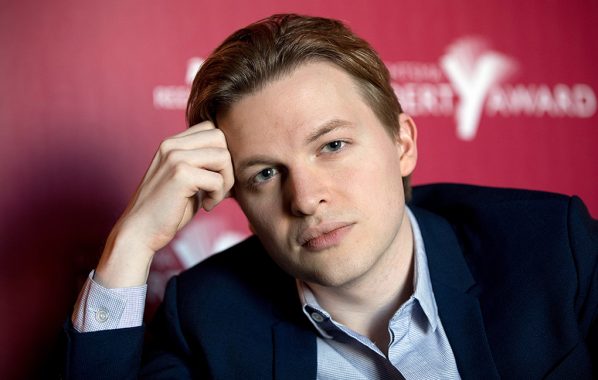
Ronan Farrow spoke about the future of journalism with Colgate students in November. Photo by Kay Nietfeld/dpa/Alamy Live News
At the end of November, Ronan Farrow, author of the explosive Harvey Weinstein sexual assault and harassment investigation published in the New Yorker, spoke with a crowd of Colgate students about the future of journalism.
Farrow rose to prominence following his 10-month investigation into Weinstein’s history, including interviews with 13 women who spoke out against the famous producer. The resulting story led to a groundswell of accusations and news coverage.
“This is not just a Harvey Weinstein problem; this is an abuse of power problem,” Farrow said. “We are realizing that, in every aspect of our society, there are vast systems in place that allow the most powerful people in our country to abuse their power and commit crimes against vulnerable individuals with impunity.”
Before becoming a journalist, Farrow graduated from Yale Law School and became a member of the New York State Bar Association. He later worked in Afghanistan and Pakistan for the Obama administration as special adviser for humanitarian and NGO affairs.
“I eventually found that the most influential thing I could do was to tell stories about the injustices that I saw,” Farrow said. “Writing is a powerful and meritocratic way to tell the world important stories.”
Now an NBC News correspondent, he hosts the investigative series “Undercover with Ronan Farrow” on the Today Show.
“There has been a clear change in what readers want from news media. They want journalism that doesn’t play it safe, that doesn’t appease those in power,” Farrow said. “Investigative journalism is becoming more sought after than ever: Even Teen Vogue has assembled an investigative unit.”
Part of the annual Milmoe Workshop in Journalism, Farrow’s talk was hosted by the Maroon-News and the Center for Leadership and Student Involvement. His visit to campus included a workshop for the newspaper’s editorial staff in addition to a public talk in Love Auditorium.
“In light of the events last spring that caused a campuswide conversation about sexual assault, we thought Farrow’s perspective would be highly relevant,” said Jackie Dowling ’18, a Maroon-News editor-in-chief. “He wants to hand the baton over to the next generation of reporters, especially on college campuses, so that his work can have a lasting impact.”
Farrow encouraged student journalists to use their voices to fight against the systemic problems young people are inheriting from previous generations, including climate change, economic inequality, and a pervasive rape culture.
“This is not going to be easy for any of you as you walk out of this school and change the amazing work that you’re doing on campus into amazing work that we all need in the world to address these problems,” he said. “Exposing injustice and fighting it is exactly what we need you to do.”
— Emily Daniel ’18
A cross-cultural classroom
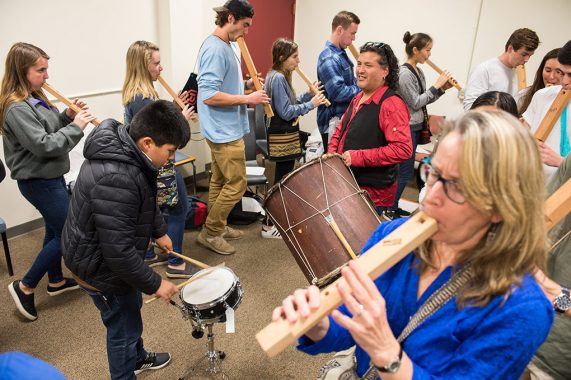
Students learn how to play Bolivian instruments with professional musicians from that country in Professor Michelle Bigenho’s class. Photo by Samto Wongso ’19
Students filed in to a rehearsal room in James C. Colgate Hall, greeting a group of Bolivian musicians with a warm “Hola!” As class started, the students didn’t grab notebooks or pens — they took out their tarka flutes to warm up. The hum of the indigenous Andean instrument began to fill the room.
Led by Professor Michelle Bigenho and invited Bolivian music director Rolando Encinas, students in ALST204 learned voice parts and songs on their tarkas and sikus (panpipes) without any sheet music. Once they got the tunes down, students practiced dancing in a circle while playing their instruments. “Feel the music,” Bigenho encouraged, translating from the Spanish-speaking musicians who accompanied the students.
ALST204: Performing Bolivian Music met five days a week for two weeks in October. In that time, students learned some oral traditions of Bolivian music with the help of the musical group Música de Maestros.
Bigenho, an anthropology and Africana and Latin American studies professor who has conducted fieldwork in Bolivia for more than two decades, met Encinas, the director of Música de Maestros, in 1993. She was introduced to him through a mutual friend and, since then, Bigenho has played her violin with the group on multiple occasions.
The professor invited Música de Maestros to Hamilton to co-teach this first-time half-credit course. Musical experience was not a prerequisite; everyone worked together to learn the music, regardless of their musical background.
“In the countryside of Bolivia, anybody in the community plays these instruments, and there isn’t a distinct ‘musician’ who trains to learn the music,” Bigenho explained. “Music is part of the community, and the ritual involved in the community.”
This style of Bolivian music is not learned through reading written music. The oral tradition of the music meant that the students had to learn through listening, imitating, and memorizing. In class, the Bolivian musicians demonstrated the melody of the songs and students recorded these to practice at home. Students also learned to find the rhythm through feeling and dance.
“They learned the context of the music, but that context is entering their body through dancing, singing, and playing,” Bigenho said. “It’s a very different way of learning.”
Students helped each other remember tarka fingerings and pronunciation of Quechua lyrics. Coordination was important. The siku was played in interlocking dialogue fashion; all of the students had only some notes of the scale on their instruments, and in order to complete an entire melody, they had to play with partners who had the other notes of the scale.
On Nov. 3, the class members took their final exam — performing with Música de Maestros and Bigenho in the chapel for a lunchtime concert. The students presented each song for the audience by explaining translations of the lyrics, the cultural significance of the instruments, and when each of the songs is performed throughout the year.
“This was different from any other experience I’ve had at Colgate,” said Ellie Robbins ’18, who used her Spanish language skills to act as a translator in the class. “I appreciated how unique, intensive, and fun it was.”
— Melanie Oliva ’18
A day of medieval play
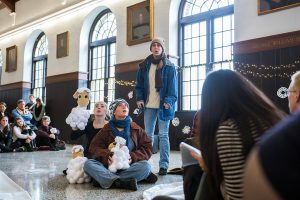
The Second Shepherds’ Play kicked off an afternoon symposium about medieval drama. Photo by Samto Wongso ’19
A struggle for survival, marital strife, and conflict between friends and enemies. Actors explored these timeless themes on Dec. 2 during The Second Shepherds’ Play, which was originally a pageant in the late medieval and early modern periods.
The play, which revolves around three shepherds and the theft of a sheep, ends when an angel visits the shepherds and announces the birth of Christ. Like a classic Nativity pageant, the shepherds travel to Bethlehem to greet the child with gifts. All the conflict at the beginning of the play ceases to matter, the birth of a holy child now paramount.
“Though it’s an early English Christmas play, it is not limited by creed, chronology, or nationality,” Professor Lynn Staley explained.
Performed in the Hall of Presidents by students from the Syracuse University Department of Drama, The Second Shepherds’ Play served as a jumping-off point for an afternoon symposium organized by Colgate professors Susan Cerasano, Christian DuComb, and Staley. During the symposium, other professors representing English and theater departments from universities around the country discussed the text and the way that performance can act as an interpretive tool.
DuComb, an assistant professor of theater at Colgate, cited the challenges and rewards of teaching medieval plays to students. “Because medieval drama feels so unfamiliar to most of my students, teaching The Second Shepherds’ Play provides an opening for me to encourage them to think critically about dramatic structure,” he said. “Since students have rarely encountered the use of parody to inspire religious devotion, the moment when they finally ‘get’ The Second Shepherds’ Play is a moment of discovery — a moment when they glimpse a previously unforeseen horizon of how drama might affect an audience in performance.”
— Melanie Oliva ’18
Giving green, getting greener
Colgate’s Green Revolving Loan Fund is a newly launched initiative geared toward reducing the university’s carbon footprint, and staff members in the Buildings and Grounds Department are already leading the way with the fund’s first energy-saving project.
The loan fund, which is seeded with $230,000, is designed to support significant physical upgrades that have a clear, measurable change in the university’s ecological impact.
“The requirements for each project are that it reduces our ecological or carbon footprint, and it has to have a return on investment,” said John Pumilio, director of the Office of Sustainability. “It has to save money and reduce our resource use, with extra attention on carbon to help meet our carbon neutrality goal of 2019.”
Individuals with project ideas must submit a proposal to the Sustainability Council for review. If the suggestion is approved, the fund finances the cost of the upgrades, and the savings from implementation go to pay back the loan, plus 20 percent, to grow the overall pool of money to fund future projects.
The first identified green loan went to the replacement of 88 light bulbs in Little Hall. That $1,300 project will cut approximately 33,000 kilowatts of energy use each year, take less than a year to repay, and will save the university nearly $20,000 during the expected lifespan of the new energy-efficient bulbs.
“We’re starting small so we can understand how to best measure the effort,” Pumilio said.
Colgate has committed to becoming carbon neutral in time for the university’s bicentennial. The revolving loan fund contributes to a concerted effort to improve building standards, increase recycling, reduce waste, and foster new programmatic offerings that enhance teaching and learning for long-term sustainability on campus.
Coming of age
When 21-year-old Lauren Sanderson ’18 looked back on her life, including four years of being away from her home in London, Ontario, she started asking questions like, “What does it mean to go from the role of daughter to woman? How do all these relationships shift as we move through the world?”
She’ll address these questions and other complications of coming of age in her new book, due out fall 2018 from Write Bloody Publishing. Sanderson earned the book deal through a contest in which she submitted a manuscript and a selection of poems. Here’s one of the poems that caught the publisher’s eye:
You Can’t Kiss My Forehead Anymore
Everyone’s daughter is a king, a king!
And our fathers crawl out behind us,
cradling the trains of our dresses.
What questions do you have for us?
Almost, it is summer.
We are rulers of men.
I speak and a city’s named.
I bleed and a preacher sings.
Name one thing that can’t
be made a crown — a blunt?
The voice of a man? A white dress
is a sin in the rain. A king never prays.
Our kingdoms come to compass us.
Boys fight for the ends of our trains.
Some of the boys are knights.
Some of the boys are nights
we crawl into for a blunt and a voice.
We blow crowns. We say fatherless things.
First flakes
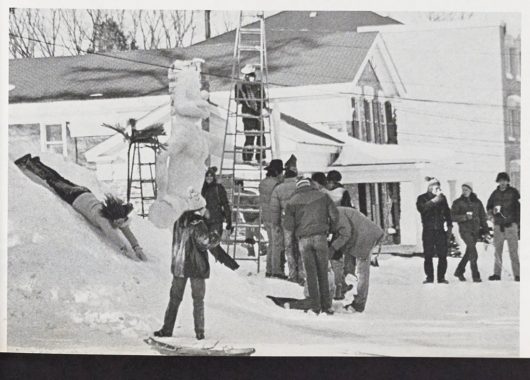
When you reminisce about your time at Colgate, the rigorous classes, beloved professors, and lasting friendships probably come to mind. In those memories, there’s likely also snow. We asked you on Facebook: “Do you remember the first time you experienced snow at Colgate?”“
“Halloween night ’93, about 24 inches. Massive freshman class-wide snowball fight on the quad.”
— Sean Costello ’97
“ When I visited my senior year of high school — at the beginning of May!”
— Bari Brandes Corbin ’94
“ I remember calling home and saying ‘they measure snow by feet here, not inches.’”
— Deb Goldstein Baum ’99
“ My freshman year roommate was from Miami, Fla., and had never seen snow before, so the first snowfall was an awesome experience.”
— Rich Duncan ’00
“ How can anyone remember the very first snow? ‘Traying’ down for meals at the Hall of Presidents. 40+ inches and the first time Colgate ever had a snow day (or 3). All important stuff for making Colgate students so resilient. Just loved my time in Hamilton.”
— Cynthia J Perry ’74
Now, relive your experience with winter on campus with the immersive colgatewinter.com.


